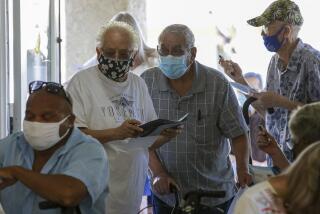Little HMOs Are Big Winners in Consumer Study : Health care: Giant companies such as PacifiCare and FHP in O.C. receive mixed reviews in first comprehensive survey to be made available to the public.
- Share via
Much like the shopper who prefers the friendliness and convenience of the neighborhood grocer to the giant supermarket, many health care consumers apparently think smaller is better, according to a survey released Wednesday.
Giant health care companies PacifiCare Health Systems Inc. in Cypress and FHP International Corp. in Fountain Valley received mixed reviews in the first comprehensive consumer “report card” on California health plans to be made available to the public.
The survey conducted by the Bay Area Business Group on Health, an insurance-purchasing coalition of 20 major California employers, involved 27,000 employees and retirees of 10 large California-based corporations, including Chevron Corp., Hughes Aircraft Co. and Rockwell International Corp.
Like a student’s report card, the BBGH survey gave the health plans letter grades of A, B or C. No plans received grades of D or F.
PacifiCare received Cs for service quality, physician services and preventive health care screening procedures. It received Bs for overall plan coverage and for programs that promote healthy living.
FHP earned Bs for service quality, plan coverage, physician services and counseling programs, and As in two preventive health-care categories measured by the survey.
Officials of neither PacifiCare nor FHP could be reached Wednesday to comment on the survey results.
The survey is part of a broader, fast-growing movement among corporate America to collect more information about the performance of health care plans so consumers can comparison shop for health care as they do for automobiles or stereos.
Many medical specialists view consumer surveys as a useful, if imperfect, way of measuring the quality of health insurance plans. Some caution that while consumers may be quite capable of evaluating an HMO’s customer service personnel or doctor’s office waiting times, they are not necessarily good judges of the quality of medical care they receive from physicians.
Although BBGH has been conducting HMO surveys for five years, it, like many large corporations conducting similar surveys, had not previously made results public.
Health Plan of the Redwoods, a mere sapling among California’s HMO giants, had the most satisfied members, notching straight As in four satisfaction categories. Of the 17 HMOs surveyed, it was the only one to receive an A+ in any category.
The Santa Rosa-based HMO, with just 85,000 members, contracts mostly with small employers--wineries, high-technology firms and the like--in Sonoma, Marin and Mendocino counties, marketing director Chuck Gardner said.
“Being smaller places us closer to the patient,” he said. “We try to encourage our doctors to maintain that one-to-one patient-doctor relationship.”
Tracy Rodriguez, associate director of BBGH, said smaller regional plans have tended to rate higher in previous surveys.
“On the other hand, some of these smaller plans are more expensive and aren’t offered by large employers who want a statewide network,” she said. She noted, however, that the price gap among the HMOs has been narrowing.
Kaiser Permanente, a giant HMO frequently touted as a national model of low-cost, quality care, ranked in the middle of the pack for both its Northern and Southern California regions. Kaiser, however, got As from its members on the quality of its preventive and health improvement programs.
Dr. Joel Hyatt of Kaiser-Southern California said the survey results highlight areas that Kaiser recognizes as weaknesses of its vast network.
“In this heated marketplace, there are things we need to do to improve,” he said. Hyatt noted that Kaiser was one of several health plans that worked with the San Francisco-based business group to develop the survey.
Overall, the survey found that HMOs excelled in health education and preventive health services, such as stop-smoking programs or childhood immunization rates. It also found that members of less-restrictive health plans, known as preferred-provider organizations, were more satisfied with their doctors and the quality of physician specialists.
BBGH members said they will use the results to evaluate the health plans they offer workers; they will also use the data to prod HMOs to improve problem areas.
The survey, administered by management consultant William M. Mercer, was sent to employees and retirees of 10 organizations. Other participants included Bechtel, the California Public Employees Retirement System, the Federal Reserve Bank of San Francisco, Fireman’s Fund, the University of California and Union Bank.
Times staff writer Greg Johnson contributed to this report.
More to Read
Inside the business of entertainment
The Wide Shot brings you news, analysis and insights on everything from streaming wars to production — and what it all means for the future.
You may occasionally receive promotional content from the Los Angeles Times.










